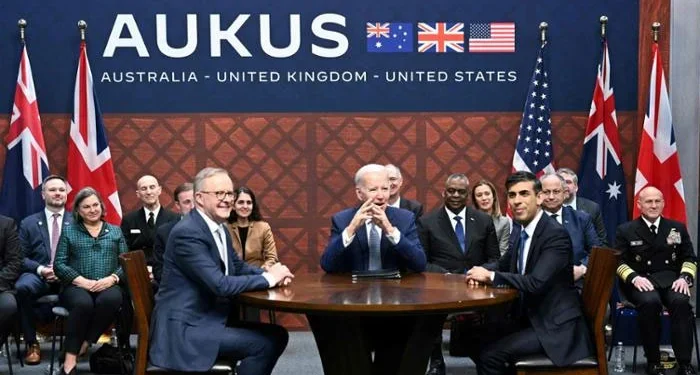The United States, Britain, and Australia have announced plans to explore potential collaboration with Japan under the AUKUS security pact, aiming to strengthen their collective efforts to counterbalance China’s influence in the Indo-Pacific region. Despite export-control constraints posing challenges, consultations on future cooperation, including Japan, are scheduled to commence this year, according to British authorities.
The upcoming summit between U.S. President Joe Biden and Japanese Prime Minister Fumio Kishida, set to take place in Washington, is expected to broach the subject of Japan’s prospective involvement in advanced capabilities projects under the AUKUS framework. However, officials caution that significant hurdles remain, particularly concerning Japan’s cyber defense capabilities and the safeguarding of classified information.
AUKUS, established in 2021, aims to confront China’s expanding dominance, with its initial focus on providing Australia with nuclear-powered attack submarines. While Japan’s role in this aspect of the pact remains unmentioned, the second pillar of AUKUS emphasizes collaboration in advanced technologies such as quantum computing, undersea warfare, hypersonic systems, artificial intelligence, and cybersecurity.
In a joint statement released by the British government, the AUKUS partners underscored their intention to engage other nations in Pillar II projects, considering factors such as technological prowess, financial resources, industrial capabilities, data protection measures, and contributions to regional stability in the Indo-Pacific.
China has vehemently criticized the AUKUS alliance, warning of potential regional arms escalation. Japanese Chief Cabinet Secretary Yoshimasa Hayashi emphasized that no decision had been reached regarding cooperation with AUKUS.
However, challenges loom large for Pillar II’s expansion, with existing U.S. restrictions on technology transfer posing significant obstacles. Former Pentagon official Bill Greenwalt cautioned against premature discussions on Japanese involvement, citing concerns over Japan’s security apparatus and its readiness for such collaborations.
Japan has recently announced plans to bolster its economic security legislation, enabling stricter classification of sensitive information and reinforcing cybersecurity measures, including the establishment of a dedicated cybersecurity force.
U.S. Deputy Secretary of State Kurt Campbell stressed the importance of Japan’s commitment to safeguarding intellectual property and enhancing accountability in handling classified data. While acknowledging Japan’s progress in this regard, Campbell noted that further steps are necessary to fully align with AUKUS objectives.
As discussions unfold, the potential inclusion of Japan in the AUKUS alliance could significantly shape regional security dynamics, underscoring the evolving geopolitical landscape in the Indo-Pacific.
















